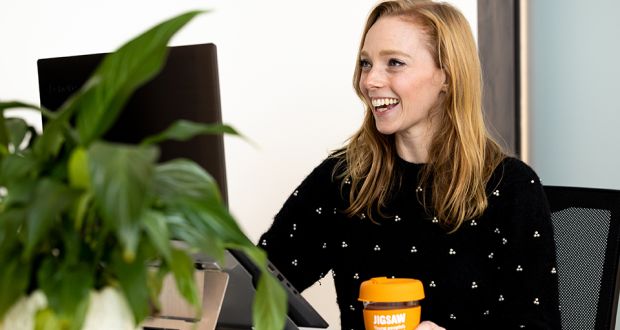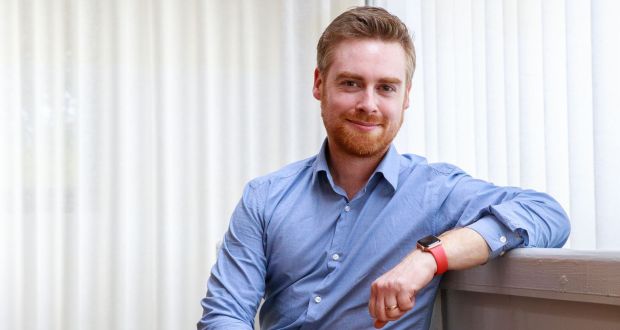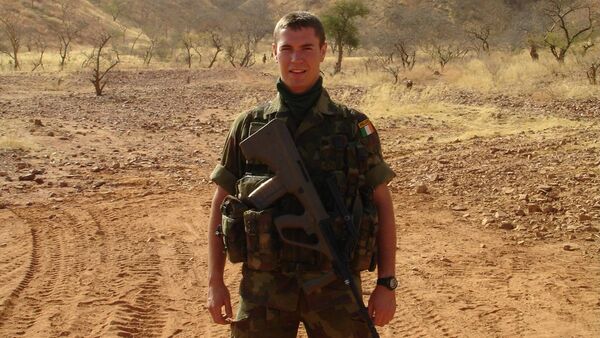This article is sponsored by Jigsaw as part of the ‘10 Minutes With…’ series.
How did you get started in your role as a mental health clinician?
I did an undergraduate degree in social care in TU Dublin (formally DIT), and went on to do a masters in social work in UCC. I had experience in a number of different areas of social care and social work before coming to Jigsaw, but have always had a keen interest in young people’s mental health. It has been an obvious thread throughout all of the work I’ve done. Then, with Jigsaw, the chance came up to work as a mental health clinician in a primary care, early intervention service. And I felt that being able to work with and support young people in the earlier stages of distress could affect more change over time.
Why did you choose to work with Jigsaw?
I followed Jigsaw’s journey from their early days. I was drawn to the organisation as it defined ‘young people’ as up to the age of 25. Being in my early 20s at the time, I did not feel equipped to be called an adult and very much appreciated that! It was another eight-ish years before I started working for Jigsaw, but I always kept up with their work through the media and their website. I liked their early intervention and prevention message, and the fact they took a holistic view of mental health. I was aware that young people were involved in ensuring the service was young-person focused, which was unique at that time. And I wanted to be part of an organisation that valued young people’s voices, and their expertise on their own mental health.
What are you working on at present?
My role is a senior Jigsaw clinician in one of our busy Dublin services. The main focus is the therapeutic work I do with young people. Jigsaw offers brief, goal focused, therapeutic supports of up to eight sessions for 12 to 25 year olds experiencing mild to moderate mental health difficulties.
The first two sessions involve screening followed by an initial assessment. The focus is on getting to know young people, the things that are going well for them, what brings them to Jigsaw, and making sure that we are the right support for them. The following sessions focus on providing evidence informed therapeutic interventions to work towards a goal of the young person’s choice. Examples of this could be reducing anxiety in certain situations, getting a better understanding of their feelings, dealing with low mood, or self-harm. Anything a young person feels they would benefit from.
Our clinicians come from a number of different disciplinary backgrounds. These include social work, occupational therapy, mental health nursing, psychotherapy, and clinical, counselling or educational psychology. All our clinicians draw on their own unique professional training, skills and past experience to work therapeutically and support young people to move towards their goal.
As a senior Jigsaw clinician I also provide support to the clinical manager, giving clinical leadership in their absence. This involves having oversight of clinical practice, supporting clinicians in managing risk, and liaising with other clinical managers for support.
There are also opportunities to get involved in promoting youth mental health in the community, by facilitating workshops for groups including professionals, educators, community volunteers, and parents.
What is the best part of your job?
There is no doubt that the best part of my job is the young people I get to meet and work with every day. It’s a huge privilege to be part of someone’s life when they are going through a difficult time, to support them on their mental health journey and empower them to continue that journey themselves when they leave Jigsaw.
I am also very lucky to be surrounded by an incredible, supportive team in our Jigsaw Dublin City service. While there can be tough moments and days, there is also a lot of laughter.
Is there career progression in Jigsaw?
I started as a Jigsaw clinician. After gaining some experience, I applied for the role of senior Jigsaw clinician. In this role I continue to work with young people, but also have a range of leadership responsibilities, such as providing support to the clinical manager in overseeing aspects of the clinical work. Clinical manager is the next step from senior Jigsaw clinician, and there are colleagues who have made this transition. Some also move to non-therapeutic roles, such as with our Research and Evaluation, and Youth Mental Health Promotion teams.
What’s the best piece of professional advice you’ve received?
You can’t know everything about everything in your chosen field or profession. Don’t focus on what you don’t know. Focus on what you do know, use and build on that.
If you could go back in time and give yourself a piece of advice at the start of your career, what would that be?
Don’t be afraid to speak up or have different opinions in meetings with other professionals. You are a professional too!
What advice would you give to someone who is thinking about interviewing for a role as a mental health clinician?
First of all, try and remember that the people on the interview panel want you to do well. Take time to go through the job description and think about how you can match your experience to the criteria and responsibilities. Try to remember that you haven’t worked in the role before, so no one expects you to be an expert, but try and show that you have done your research.
As part of this, it can be helpful to think about what your experience is and how it can be applied to the role. Think about how you have worked with people: in a person centred way? Strengths focused? Using particular modalities such as CBT, ACT or CFT, to name just a few! Try to think about your experience in terms of ‘what did I do, how did I do it, what did I learn, anything I would do differently’.
If you are asked to talk about a piece of work you have done, don’t talk about something too straightforward, speak about something with complexity to show off your skills and talk about how you managed it.
What would you say are the key skills and capabilities necessary to be good at what you do?
I think the most important skill or capability is being able to offer a young person a safe environment where they feel listened to and heard. The assessment, formulation, risk management, intervention and evaluation skills are all necessary and important. But interpersonal, human qualities are also incredibly important. These include things like compassion, empathy, relationship building, being open, curious and flexible, active listening, moving at the young person’s pace. Think about how your younger self would have wanted to be treated. Good time management skills will also definitely help, as it’s a busy environment!
What is the best career lesson you have learned so far?
Getting to where you think you want to be in your career is not a straight road. There’s lots of twists and turns, and you may end up in jobs or places you didn’t expect. But sometimes these are the most valuable experiences, where you learn the most about the work and yourself. And in some cases the most fun!
If you were applying for a clinical role in mental health today, how would you prepare?
Pay attention to different forms of news and try to get a sense of the mental health landscape at this time. Try to be aware of different opinions and arguments, not just ones that are similar to your own opinions.
If you are considering a role with young people, I would have a look at the My World Survey, by Jigsaw and UCD. This is the most up-to-date research in relation to the landscape of youth mental health in Ireland.
And consider the job description, how do your skills, experience and attributes fit in with this.
Which industry professionals should people be following on Twitter/ LinkedIn?
IASW – Irish Association of Social Workers
Mad in America – Science Psychiatry and Social Justice
Dr Lucy Johnstone
EPIC – Empowering People in Care
ACAMH – The Association for Child and Adolescent Mental Health
Is there a particular book or resource you’d recommend to someone early in their career?
The Gift of Therapy by Irvin D. Yalom
The Body Keeps the Score by Bessel van der Kolk
The Happiness Trap by Russ Harris
Anything by Brené Brown!










